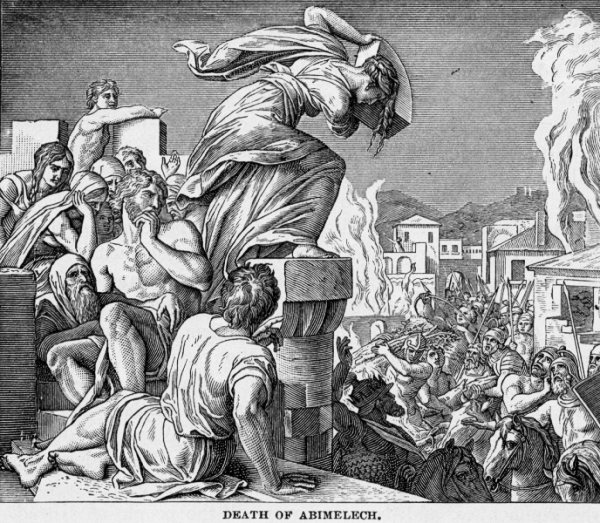A couple of things in the news got me thinking. First I saw Tim Alberta out promoting his new book, The Kingdom, the Power, and the Glory: American Evangelicals in an Age of Extremism. Then I saw that Benjamin Netanyahu has ordered the flooding of Gazan tunnels with sea water. Something about these stories just put me in an Old Testament kind of mood.
Now, I’m not a theologian, but I am basically familiar with the Deuteronomistic story of ancient Israel. The basic formula is that Yahweh makes a covenant with Israel imposing certain obligations in return for a promised land, but Israel doesn’t live up to its end of the bargain. Yahweh then punishes Israel by delivering them into the hands of their enemies. When Israel repents, Yahweh provides a leader who vanquishes the enemy and restores peace and prosperity. And then the cycle repeats itself.
That’s certainly the pattern in the Book of Judges. But there’s one judge, named Abimelech, who doesn’t precisely fit that pattern. Without going into too much detail, Abimelech finagles himself into power and then promptly kills all but one of his seventy siblings. After a period of time, there is an uprising that challenges his power, but he confronts the insurgents at a city called Shechem. He destroys the city and all its inhabitants. Then he covers the ground with salt so that nothing can grow there. This is where we get the term “salting the earth.”
Clearly, Abimelech did not produce peace and prosperity. In fact, he was killed in his next battle when a woman dropped a millstone on his head. He appears to have been a thoroughly shitty ruler who met a just end.
And that’s basically consistent with the overall ethic of these ancient stories. Bad things happen to bad people. But, in the larger framework, when the Israelites stray from Yahweh, Yahweh brings the hammer down on everyone in a form of collective punishment. This solves two problems at once. It provides a ready explanation for why catastrophes happen, as well as an easy-to-understand solution.
It’s my belief that the Holocaust did some serious damage to this worldview for the simple reason that no one was prepared to argue that the Jews were delivered into Hitler’s grasp as part of God’s plan, or as punishment for impiety or some other sin. This could be one reason why the response to the Holocaust wasn’t a return to old religious ways but a much more secular outlook aiming for political autonomy and self-determination.
Either way, there’s still a compelling element to these Biblical stories, particularly the ones that follow a cyclical pattern and so can be expected to repeat themselves. The evangelicals are always looking for these patterns as well as trying to put every square development into a round prophesy. I don’t put much stock in this way of thinking and predicting, except I guess to the extent that those who do think this way are capable of turning their delusions into self-fulfilling facts. If, for example, enough people believe that doing something will hasten the second coming of Christ, they just might bring that something about. It won’t actually bring Jesus back, but it will still change the world in ways we may or may not like. In our nuclear age, these kinds of people are fully capable of hastening Armageddon.
But that’s a bit of a digression from my main point. I was talking about shitty leaders salting the Earth, which means I was talking about Benjamin Netanyahu, our modern day Abimelech. I didn’t mention it, but the city Abimelech salted is near modern-day Nablus in the West Bank. The Romans called it “Flavia Neapolis,” so I think you can tell how it got its modern name. It lies about 30 miles north of Jerusalem and is populated by about 150,000 Palestinians.
Biblical shit still goes down in and around Nablus. For example, this just happened on October 12.
No matter how hard he tries, Abdulatheem Wadi is unable to hide the devastating pain written all over his face.
With his eyes fixed on the distance, the 50-year-old chokes up as he recalls how Israeli settlers murdered his 63-year-old brother Ibrahim and his 24-year-old nephew Ahmad, on October 12, while they were attending a memorial service for a group of Palestinians also killed by settlers the previous night.
What was a funeral for four became a funeral for six.
“It was a massacre in a small village,” says Abdulatheem.
That village is Qusra, home to some 7,000 Palestinians living just south of Nablus in the northern occupied West Bank.
Even though the funeral procession and its planned path were approved by the Israeli army through the Palestinian Authority (PA) side of the District Coordination Office (DCO), it was still attacked, Abdulatheem explained.
He was standing some 20 metres (66 feet) away from his relatives when they were shot dead.
“We were surprised to find a settler ambush. My car was the first car in the procession – I was in front of the four ambulances carrying the four martyrs,” he recalls.
“Armed settlers then jumped onto the main road, put burning tyres and blocked our path. We couldn’t go forward or back – it was chaos. Then, there was indiscriminate live fire and rocks being thrown at us by the army and settlers,” says Abdulatheem, adding that the “Israeli soldiers were standing with the settlers and were shooting at us.”
“Within minutes, another settler car came and fired at my nephew and brother while they were standing on the street after they had gotten out of their car, killing them,” he continues, his voice cracking.
“My other nephew Yasser – Ahmad’s brother – is 14 years old. The settlers showered the car he was sitting in with bullets,” says Abdulatheem. “He doesn’t speak any more. Many people have tried to get him to talk, with no luck.”
The settlers do as they like because Netanyahu relies on them for his political power. The settlements have expanded at a relentless pace under Netanyahu’s watch, as part of his plan for preventing the Palestinians from getting an autonomous state.
But it’s in Gaza where Netanyahu is destroying cities and their inhabitants and salting the earth. And, of course, salinating Gaza’s already wrecked ground water supply could last generations. We’re talking about an already wrecked aquifer that, without treatment, is 95 percent undrinkable.
And this is beginning to make President Joe Biden uncomfortable. He’s starting to make it clear to Israelis that they need a new leader, although he’s saying this in an indirect way. For now, he’s casting blame more on hardline members of Netanyahu’s ruling coalition and war cabinet than on the prime minister himself:
“He’s a good friend, but I think he has to change and — with this government, this government in Israel is making it very difficult for him to move,” the president said.
“One of the things that Bibi understands, I think, now — but I’m not sure [Israel’s Minister of National Security Itamar] Ben-Gvir and his War Cabinet do, who I’ve spoken to several times — is that Israel’s security can rest on the United States, but right now it has more than the United States. It has the European Union, it has Europe, it has most of the world supporting it. But they’re starting to lose that support by the indiscriminate bombing that takes place,” Mr. Biden said…
“But we have to make sure that — that Bibi understands that he’s got to make some moves to strengthen [the Palestinian Authority] — strengthen it, change it, move it,” the president said, according to the White House transcript. “You cannot say there’s no Palestinian state at all in the future. And that’s going to be the hard part.”
That’s for public consumption, but privately things are different:
Biden’s comments came as Netanyahu pushed back against the U.S.‘s postwar plan to have Gaza ruled by the Palestinian Authority, a sign of growing tensions and disagreements between the two leaders. As Netanyahu heightens his rhetoric against the Palestinian Authority, the Biden administration has become increasingly convinced that the prime minister has entered “campaign mode” and is prioritizing politics over security interests, two U.S. officials told The Times of Israel.
The leaders, or judges, depicted in the Book of Judges are all flawed in their own way, with the possible exception of Deborah. Perhaps they were not complete knuckleheads, but their failures have drawn comparisons to Netanyahu in the past. Yet, flawed as they might have been, they at least delivered for the Jewish people. That is why I compare Netanyahu to Abimelech, the man who razed a city, killed its inhabitants and salted the earth but did not bring peace and prosperity.
Netanyahu brought ruin on his people and delivered them up to their enemies. He did this though decades of policy aimed at denying the Palestinians a two-state solution, including bolstering Hamas. He did it by governing through division and acrimony. He did it by neglecting his national security duties. And now he is doing it by driving his allies away with his wanton disregard for human life.
Biden is quietly holding a millstone over his head. He really has no choice but to let it drop.
Abimelech took his ax and chopped a bundle of firewood, picked it up, and put it on his shoulder. He said to his troops, “Do what you’ve seen me do, and quickly.” So each of his men cut his own bundle. They followed Abimelech, piled their bundles against the Tower fortifications, and set the whole structure on fire. Everyone in Shechem’s Tower died, about a thousand men and women.
Abimelech went on to Thebez. He camped at Thebez and captured it. The Tower-of-Strength stood in the middle of the city; all the men and women of the city along with the city’s leaders had fled there and locked themselves in. They were up on the tower roof. Abimelech got as far as the tower and assaulted it. He came up to the tower door to set it on fire. Just then some woman dropped an upper millstone on his head and crushed his skull. He called urgently to his young armor bearer and said, “Draw your sword and kill me so they can’t say of me, ‘A woman killed him.’” His armor bearer drove in his sword, and Abimelech died.
I don’t believe history is cyclical but maybe it rhymes. I don’t think Israel will have peace and prosperity until Netanyahu’s political career is over, and that’s triply true for the Palestinians.







